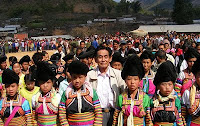Kokang Thwart Burma Army Drug Raid
By LAWI WENG
The Irrawaddy News
Tension is high between the Burmese military and the Myanmar National Democratic Alliance Army (MNDAA), a Kokang ceasefire group, following an attempted drug raid by some 70 Burmese troops on the house of the Kokang group’s chairman on Saturday, according to sources in the area.
Aung Kyaw Zaw, a Burmese analyst based at the Sino-Burmese border, told The Irrawaddy that the Burmese army stood down after a standoff that lasted five and a half hours.
The MNDAA chairman, Peng Jiasheng [Burmese: Phon Kyar Shin], reportedly ordered 300 of his soldiers to block the route in anticipation of the Burmese army attempting a raid. The Burmese were encircled by Kokang insurgents while negotiations took place, said Aung Kyaw Zaw. Kokang leader Peng Jiasheng poses for a photograph with Kokang children at a local festival on February 3. (Photo: www. kokang.net)
Kokang leader Peng Jiasheng poses for a photograph with Kokang children at a local festival on February 3. (Photo: www. kokang.net)
Peng reportedly told the Burmese army that they could search his home if they entered unarmed. Otherwise, he reportedly said he would order his troops to open fire on them. With no solution in sight, the Burmese army retreated.
Meanwhile, about 10,000 Kokang residents in Laogai Township fled to the Chinese border on Saturday in fear of clashes between the two armies, according to the sources.
Tensions escalated further on Sunday when Peng Jiasheng refused to meet Maj-Gen Aung Than Htut, the northeastern regional commander, according to the border sources.
The Burmese regional commander allegedly wanted to meet his Kokang counterpart regarding the Kokang ceasefire group’s recent rejection of a Burmese military proposal to transform the MNDAA battalions into border guard forces.
Mai Aik Phone, who is close to several ceasefire groups in the area, told The Irrawaddy on Monday that more Burmese troops have been deployed in the region following the MNDAA’s rejection of the proposal.
“It is obvious they [the Burmese army] are threatening the Kokang people and their army by dispatching more troops into the area,” he said.
However, the two analysts estimated that the Burmese military will not take strong action against the Kokang group at the moment because of Aung San Suu Kyi’s ongoing trial and the fact that the country is due to hold general elections next year.
According to various sources at the Sino-Burmese border, the Burmese military has established a Regional Operations Command (ROC) with seven infantry battalions in Kokang territory in recent months.
The ethnic Kokang army was originally assigned status as an autonomous region of northern Shan State after the Kokang and the Wa army defected from the Communist Party of Burma in 1989.
Along with the Wa, the Kokang are believed to be involved in the drug trade, according to international anti-narcotic agencies. However, Kokang leaders have claimed their territory has been drug-free since 2003.
Meanwhile, the Burmese military has reportedly deployed more troops around ethnic armed ceasefire groups’ areas in the wake of the groups’ refusals to transform to border guard duties.
In recent months, the junta has pressured Burma’s ceasefire groups to participate in the forthcoming election in 2010. The junta has reportedly encouraged them to give up their arms in the post-election period.










